Top 25 Singlish Words and Phrases Every Traveller Should Know
English is our official language, but let’s just say it has a distinct local (sometimes spicy) flavour here called Singlish. It’s this fun, quirky blend of languages that makes communicating both amusing and surprisingly efficient.
If you want to sound like a local (or at least not get completely lost in conversation), picking up some key Singlish words is a must. Here’s a handy list of expressions to get you chatting like a pro and blending in with the locals faster than you can say “lah!”
“Lah”
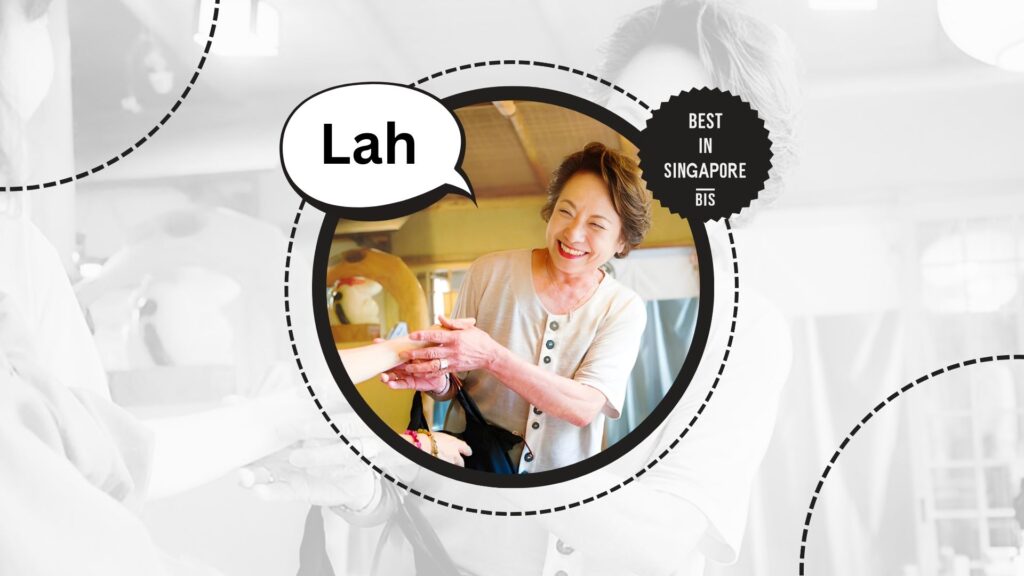
When to use: To emphasise certainty; to sound casual or friendly
Example: “No problem lah!”
Arguably, the most used Singlish word is “lah.” It’s an all-purpose article used for emphasis, casualness, or to soften a statement, making it a staple in everyday conversations.
Think of it as a way to sound friendlier, so don’t be shy to sprinkle it into your conversations. Just say “Thank you lah” or “No need lah” and you’ll blend right in with the locals.
Pro-tip: You can simply say “can lah” when agreeing to something.
“Lor”
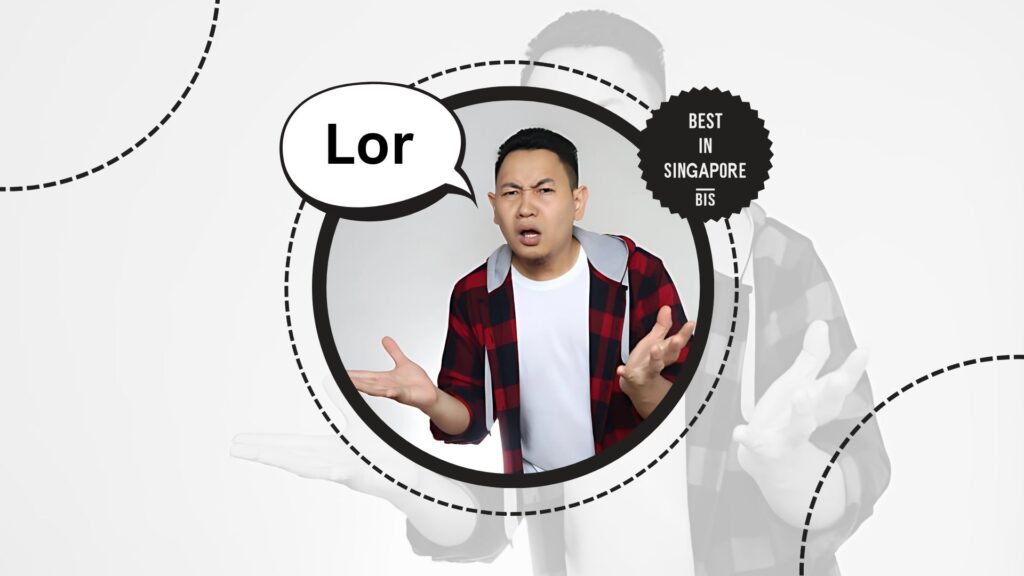
When to use: To show resignation in a situation; to reluctantly agree with something
Example: “Up to you lor.”
Whether you’re stuck in traffic or just accepting that your food is going to be late, a simple “What to do lor” shows you’re going with the flow.
For travellers, use “lor” when you’re resigned to a situation or agreeing casually without much fuss. Say “No more tickets. What to do lor” or “Alright, I follow you lor” and you’ll sound like you’ve embraced Singapore’s laid-back attitude in no time!
Pro-tip: It’s perfect for those “What to do?” moments, like when plans change or things don’t go as expected. Just drop a “No choice lor” and move on with ease.
“Leh”

When to use: When asking for clarification; to express doubt
Example: “I don’t know leh. Maybe later.”
Saying “leh” is just a way to keep things light and open-ended even when things are doubtful. At least, that’s my interpretation of it.
For travellers, use “leh” when you want to sound polite and not too forceful, especially when making suggestions or asking for clarification. It softens your tone, so instead of sounding demanding, you’ll sound friendly and open to options—perfect for travel chats and asking for advice!
Pro-tip: Try saying, “You sure this is the right bus leh?” or “Why not try this dish leh?” and you’ll come across as friendly and approachable.
“Balik kampung”

Meaning: Literally “return to the village;” go back to one’s hometown
When to use: When heading home for the holidays; moving back home temporarily
Example: “Tomorrow’s a public holiday, so a lot of people will balik kampung.”
Growing up, every long weekend meant one thing for me—balik kampung! We’d pack up the car and head back to my grandparents’ place where the smell of home-cooked food and the warmth of family always awaited.
For travellers, you’ll hear “balik kampung” a lot, especially during major holidays like Hari Raya or Chinese New Year. It’s a lovely way to describe going home to reconnect with family.
Pro-tip: It’s a phrase packed with nostalgia, so it’s perfect when locals talk about reconnecting with their roots. Just don’t use it casually for short trips or vacations.
“Siao”

Meaning: “Crazy” or “insane”
When to use: To describe something over-the-top; to express disbelief or shock
Example: “You go jogging in this heat? Siao!”
I was just suggesting we climb Bukit Timah Hill at noon with a friend, which is, in Singapore heat, totally siao. In hindsight, that was a dumb idea.
For travellers, “siao” is your go-to word when something sounds completely absurd or over-the-top. Just use it when you’re shocked or find something ridiculous, like saying “Queue three hours for bubble tea? Siao ah!” and you’ll fit right in with the locals.
Pro-tip: Remember—”siao” is best used among friends or in casual conversations.
“Wah lau”

When to use: To express shock; to mildly complain or show exasperation
Example: “Wah lau, you late again!”
“Wah lau” is one of those versatile expressions locals use to show shock, disbelief, or mild annoyance at anything from long queues to surprising prices.
For travellers, “wah lau” is your go-to phrase when something catches you off guard, especially if it’s unexpected or frustrating. Whether it’s “Wah lau, so crowded!” or “Wah lau, you bought that?” sprinkle it into conversations to sound like a true local.
Pro-tip: It’s perfect for everyday moments when you’re reacting to something unexpected or mildly annoying. Just make sure to say it with the right tone to match the situation!
“Shiok”

When to use: When enjoying delicious food; after a fun activity
Example: “This laksa is damn shiok!”
The first time you try Singapore’s chilli crab and you love it, simply say “shiok!” and everyone will understand you’re having a heavenly gustatory experience.
Whether it’s great food, a relaxing massage, or an awesome beach day, “shiok” is the perfect word to describe anything that feels really good. It’s a must-use phrase when you experience something enjoyable or indulgent.
Pro-tip: Just say, “This laksa is so shiok!” or “That swim was shiok!” and you’ll be speaking like a local who knows how to appreciate the good stuff in life.
“Paiseh”

When to use: When you’ve inconvenienced someone; when you do something wrong by accident; when you feel shy about a compliment
Example: “Sorry, I’m late paiseh.”
When you accidentally bump into someone, you might instinctively say “sorry”, but a good local term for it would be “paiseh!” It’s the perfect word for those little awkward or embarrassing moments when you feel a bit shy or apologetic.
“Paiseh” is great for when you want to say sorry in a light-hearted way, especially in casual situations. If you accidentally cut in line or ask for help, just say, “Paiseh, didn’t see you!” and you’ll sound polite and local at the same time.
Pro-tip: Don’t overuse “paiseh,” as it might make you seem overly apologetic or unsure, which can come across as lacking confidence.
“Kiasu”

Meaning: Describes someone afraid to lose out or is overly competitive
When to use: When someone arrives early to secure a spot/takes more than they need
Example: “That’s so kiasu. Wake up at 5 AM to queue!”
I remember rushing to a sale hours before it started, only to find a long line already—classic “kiasu” behaviour! In Singapore, being “kiasu” means you’re afraid to lose out, so people go the extra mile to be early, get the best deal, or secure a spot.
“Kiasu” is great for describing moments when someone goes overboard to avoid missing out. If you see someone camping out for a deal or hogging free samples, you can say, “Wah, so kiasu!” It’s a playful way to point out competitive behaviour without sounding harsh.
Pro-tip: Use “kiasu” in a light-hearted or playful way to describe competitive or over-prepared behaviour, but avoid using it in situations where it could sound judgmental or critical.
“Alamak”

When to use: When you make a mistake; when something unexpected happens
Example: “Alamak, I forgot my wallet!”
When I miss a bus, I can’t help but say, “Alamak!” It just slips out. It’s the go-to word when you’re caught off guard or frustrated by a small mishap, like forgetting your wallet or dropping your phone.
“Alamak” is your all-in-one reaction word for those “oh no!” moments. Whether you missed a train or spilt your drink, just say, “Alamak!” and locals will instantly understand your frustration, keeping the mood light and relatable.
Pro-tip: Avoid using alamak during solemn events like funerals or religious ceremonies where it might come across as insensitive.
“Blur”
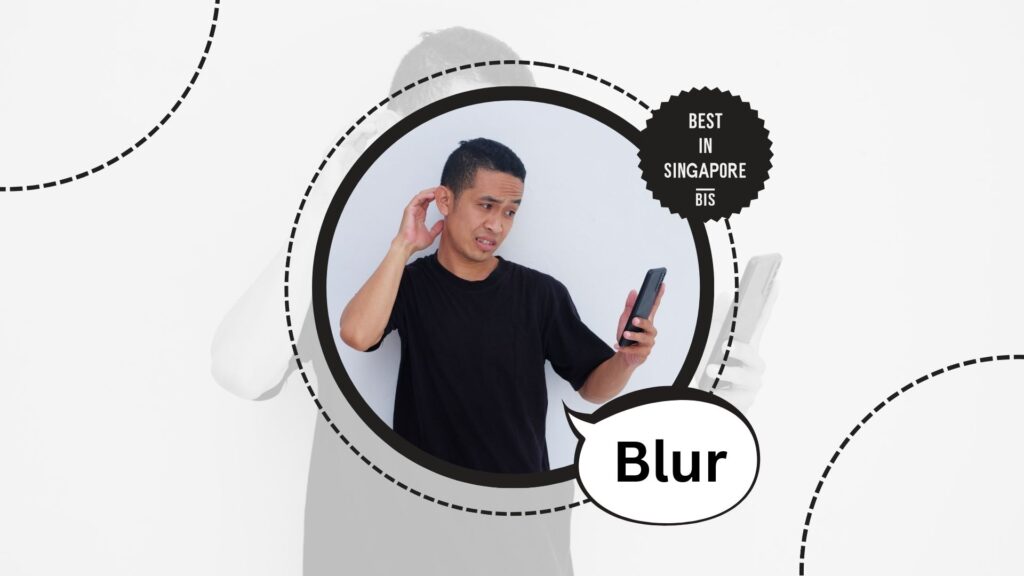
When to use: When someone doesn’t understand what’s happening/is spaced out or daydreaming
Example: “You so blur today. What happened?”
Once, my friend was so “blur” that she missed our meeting spot even though we’d been there a dozen times! In Singapore, we use “blur” to describe someone who’s confused, daydreaming, or just not paying attention, and it’s often said in a teasing, affectionate way.
For travellers, “blur” is great to use when you or someone else is having a moment of confusion. If you find yourself unsure or making mistakes, you can say, “Sorry, I’m so blur today!” and locals will get a laugh out of it while appreciating your self-awareness.
Pro-tip: Avoid the term in formal or sensitive contexts to prevent it from sounding dismissive or unkind.
“Ang moh”

Meaning: Refers to Caucasians or Westerners
When to use: When talking about Western behaviour or culture; playful teasing among locals
Example: “The ang moh ordered kopi-o!”
I was sitting at a hawker centre when my local friend pointed to a tourist and said, “Wah, the ang moh ordered kopi-o!” It’s a casual way to refer to Westerners or Caucasians in Singapore.
If you’re curious about local lingo, you might hear it casually in conversations like, “The ang moh really likes local food!” but always gauge the context before joining in.
Pro-tip: “Ang moh” is generally used in a neutral or light-hearted way to describe Westerners, but it’s best to avoid using it too freely, especially in formal settings.
“Cheem”

When to use: When discussing a difficult topic; when using jargon or technical language
Example: “This math problem is very cheem ah.
When someone explained Singapore’s public housing system to me as a kid, I was lost and had to admit, “Wah, this is so cheem!” It’s the perfect word for when something feels deep, complicated, or tough to grasp, whether it’s a topic, explanation, or concept.
It’s a great way to describe things that are intellectually challenging to understand. If you find a conversation or local custom hard to follow, just say, “Wah, cheem ah!” and locals will get that you find it a bit complex.
Pro-tip: If someone is trying to explain something and you call it “cheem” too quickly, it might seem like you’re dismissing their explanation or not willing to understand. Avoid doing this.
“Makan”
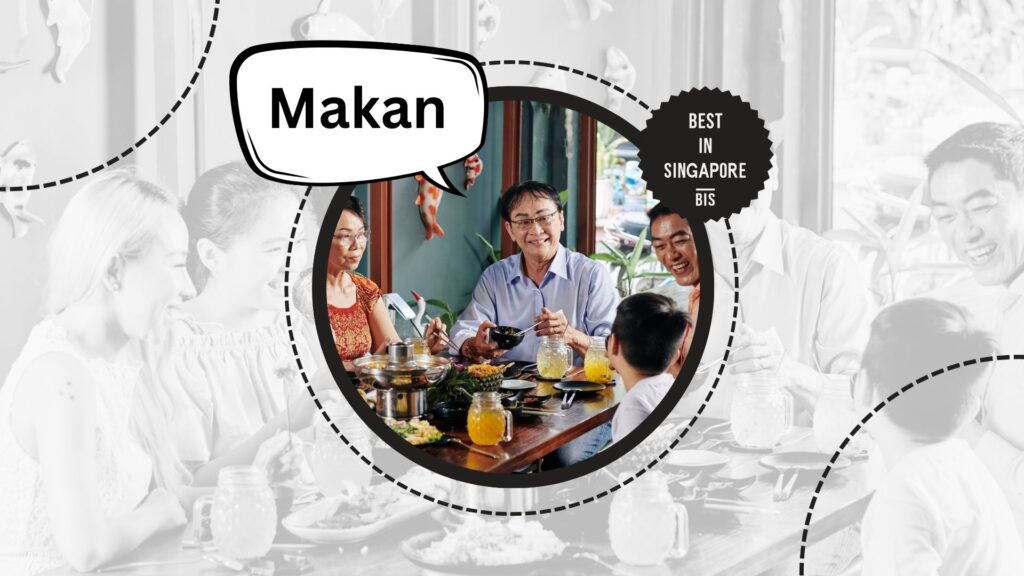
Meaning: “To eat” or “food”
When to use: When asking someone to go for a meal; encouraging someone to eat more
Example: “Let’s go makan! I’m starving!”
“Makan” simply means “to eat,” and it’s used all the time when locals talk about grabbing food or sharing a meal. So don’t be surprised to hear “Let’s go makan at the hawker centre!” as eating is a national pastime.
For travellers, “makan” is a must-know word, especially when you’re out exploring Singapore’s vibrant food scene. Whether you’re hungry or just planning your next meal, saying “Let’s makan” will get you instant points with the locals.
Pro-tip: Use “makan” in informal, casual settings, especially when discussing food with friends and family. In formal or sensitive situations, stick to more neutral or polite expressions like “have a meal” or “eat.”
“Tapao”

When to use: When asking for good to go at a restaurant/hawker stall
Example: “Can tapao the chicken rice?”
When you can’t finish your meal at a hawker centre, a local might tell you, “Just tapao it lah!” “Tapao” is the go-to word in Singapore for taking your leftovers or any food to go.
It’s incredibly useful when you want to bring food home or pack up what you can’t finish. Just say, “Can I tapao this?” and you’ll be on your way with your meal neatly packed—perfect for when you’re exploring and want to eat on the go.
Pro-tip: Be discerning. Some upscale or fine dining establishments may not offer the option to take food away, and asking for “tapao” might seem out of place.
“Bojio”
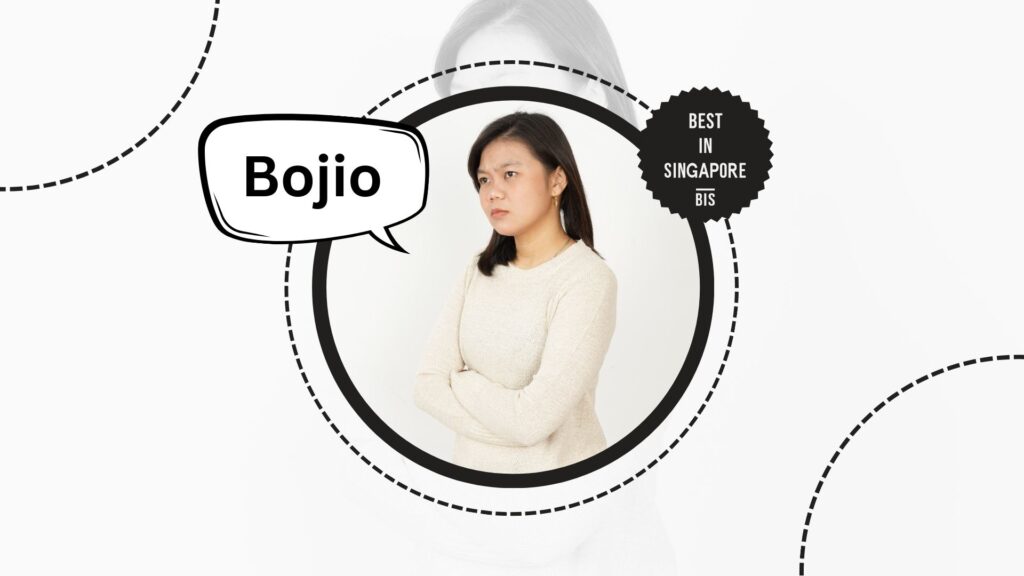
When to use: When you have that FOMO after learning you weren’t invited or were excluded; often used playfully
Example: “You all went karaoke? Bojio!”
I was scrolling through my Instagram feed and saw my friends at a rooftop bar without me. So I texted them, “Wah, bojio!” It’s the perfect playful way to let your friends know you feel left out when they don’t invite you to something fun.
“Bojio” is a casual and friendly term that can be used when your friends hang out without telling you. Just say, “Eh, bojio!” and you’ll sound like a local, but remember—it’s all in good fun and not meant to be taken too seriously!
Pro-tip: If someone wasn’t invited for a legitimate or sensitive reason (e.g., personal, cultural, or health reasons), saying “bojio” could seem insensitive or dismissive.
“Chope”
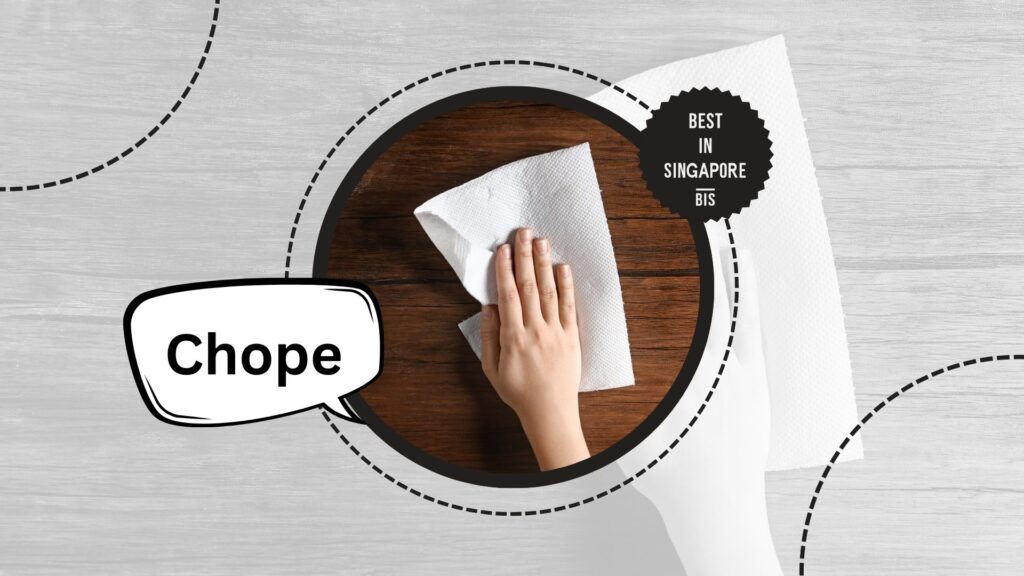
Meaning: To reserve something, usually by placing a tissue packet on a seat at a hawker centre
When to use: When reserving a seat; calling dibs on the last piece/item
Example: “I choped the seat already.”
At any hawker centre, you may notice tissue packets on tables and wonder what’s going on. It’s simple; that’s how we reserve seats!
In Singapore, “chope” means to reserve a spot, usually by placing something small but noticeable like a tissue packet on the table. It’s your secret to scoring a seat at busy food spots without having to miss out on in-demand food items that require queueing.
Pro-tip: Just leave an item like a tissue packet or umbrella on a chair, and voila, your seat is saved. Locals will immediately know you’ve claimed the spot.
“Kopi”

Meaning: Coffee, usually followed by variations like “kopi-o” (black coffee) or “kopi-c” (coffee with evaporated milk)
When to use: When customising a coffee order
Example: “One kopi-c, please.”
“Kopi” is the magic word for local coffee with all its variations depending on how you like it. When I use it, I mean a perfectly sweet cup with condensed milk.
Knowing how to order “kopi” is key to enjoying Singapore’s coffee culture. Whether you want it black (kopi-o) or with evaporated milk (kopi-c), just use the right word and you’ll get your caffeine fix like a local in no time!
Pro-tip: Asking for “kopi” in an international chain like Starbucks or a formal restaurant might confuse the staff. It’s more suitable at local, informal dining establishments.
“Jialat”
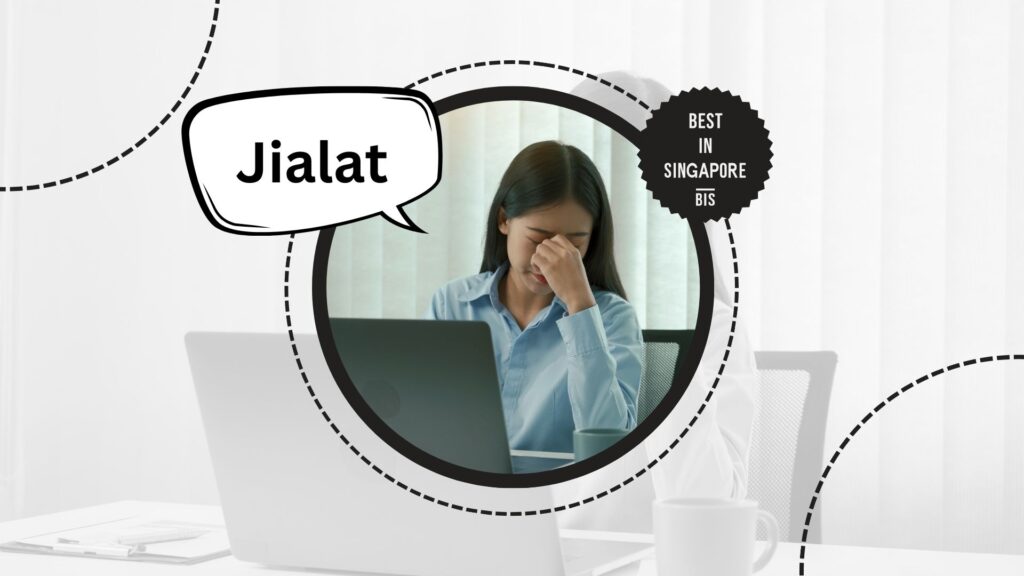
Meaning: Something is bad or in trouble
When to use: When you’re in a difficult situation; when someone is in bad shape
Example: “Wah, this weather jialat ah. Cannot go out.”
“Jialat” is used when things go really bad, whether you’re stuck in a jam or a tough situation. I uttered it several times as a college student racing for my first class in the morning.
It’s great for expressing when something goes wrong or feels overwhelming. If you’re in a sticky spot, like missing a flight or dealing with a long delay, just say “Jialat!” and locals will instantly understand your frustration.
Pro-tip: Avoid using “jialat” during emergencies or grave circumstances (e.g., accidents and medical crises). That may trivialise the issue.
“Yaya papaya”

Meaning: Refers to someone arrogant or boastful
When to use: When someone is showing off too much; to a know-it-all
Example: “Don’t be so yaya papaya lah.”
My friend aced one exam and wouldn’t stop talking about it for days. We all jokingly called him “yaya papaya” for being so full of himself. It’s the perfect phrase to tease someone who’s acting a bit too proud or cocky playfully.
For travellers, “yaya papaya” is best used in casual settings to poke fun at friends who are being a little too boastful. Just say, “Wah, don’t be such a yaya papaya!” to bring someone back down to earth with a laugh. It’s all in good humour!
Pro-tip: Don’t use it if someone is genuinely proud of an achievement after working hard. Calling them “yaya papaya” can come off as dismissive or hurtful.
“Heng”

Meaning: Refers to something lucky
When to use: When you receive good news; when you narrowly avoid a bad situation
Example: “Heng ah, I caught the last bus.”
I once got stuck in traffic on the way to the airport, and when I finally arrived just in time for my flight, I couldn’t help but say, “Heng ah, I made it!” In Singapore, “heng” is what you say when you’re feeling lucky or relieved for not being in trouble.
It’s your go-to phrase when things work out in your favour. But if someone is going through a difficult or tragic situation, saying “heng” could appear disrespectful, as it downplays the seriousness of the moment.
Pro-tip: If you manage to snag the last seat on a bus or avoid a sudden downpour, just say, “Heng ah!” and locals will instantly relate to that feeling of luck and relief.
“Sian”

When to use: When you have nothing to do; when you feel emotionally draine
Example: “So sian. Nothing to do today.”
“Sian” is a great word to use when you’re feeling a bit worn out or frustrated. Whether you’re stuck in a long queue or dealing with a delayed flight, just say, “So sian ah” and it will succinctly sum up your mood.
After a long day of meetings that just seemed to drag on, I usually say, “Wah, today damn sian.” It’s the perfect word for when you’re feeling bored, tired, or just fed up with repetitive or draining situations.
Pro-tip: Avoid using “sian” during a work meeting or in front of colleagues, as it might sound unprofessional, especially if it conveys boredom or dissatisfaction.
“Onz”

Meaning: Enthusiastic or willing to participate
When to use: When you’re ready to take action/eager to join an activity
Example: “You onz for tonight’s party?”
For travellers, “onz” is great for confirming your participation or excitement about plans. If someone invites you out or suggests an activity, just say, “Onz!” to show you’re totally in. Locals will love your eager, go-with-the-flow attitude.
As an example, when my friend asked if I wanted to join a late-night supper after a long day, I immediately replied, “Onz!” It’s the perfect Singlish word to show you’re enthusiastic and ready to dive into something fun without hesitation.
Pro-tip: If your boss asks if you’re ready for a presentation, saying “onz” instead of “yes” might sound too casual. Be sensitive to the situation.
“Confirm plus chop”

Meaning: Something is guaranteed or certain
When to use: When double-checking an arrangement; making a firm commitment
Example: “Confirm plus chop, he’s coming.”
In Singapore, saying “confirm plus chop” is the ultimate way to guarantee something is 100% certain, leaving no room for doubt. It’s the perfect thing to say when you want to emphasise that something is locked in and guaranteed.
So if you’ve made reservations or secured a spot, just say, “Confirm plus chop!” and people will know you mean business—no second-guessing required!
Pro-tip: Avoid using it when there is genuine uncertainty, as it can come across as overconfident or misleading.
“Kaypoh”
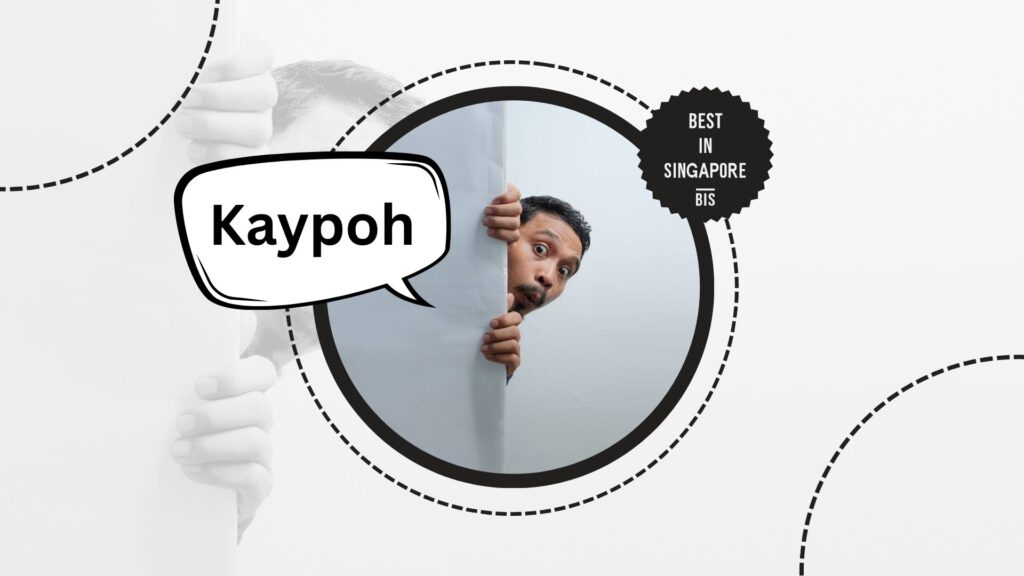
Meaning: Refers to being a busybody or overly curious
When to use: When you want someone pestering you to leave you alone
Example: “Why you so kaypoh, always asking questions?”
I once noticed my neighbour peeping through the window while I was chatting with a friend, and my buddy laughed, saying, “Wah, so kaypoh!” It’s the perfect word to describe someone who’s being nosy or overly curious about other people’s business.
“Kaypoh” is great when referring to someone who can’t help but get involved in things that don’t concern them. So if you spot someone being a bit too curious, you can say, “Don’t be so kaypoh!” but keep it light-hearted to avoid hurt feelings.
Pro-tip: Be sensitive; if someone is being helpful or showing concern, calling them “kaypoh” could minimise their intentions.


